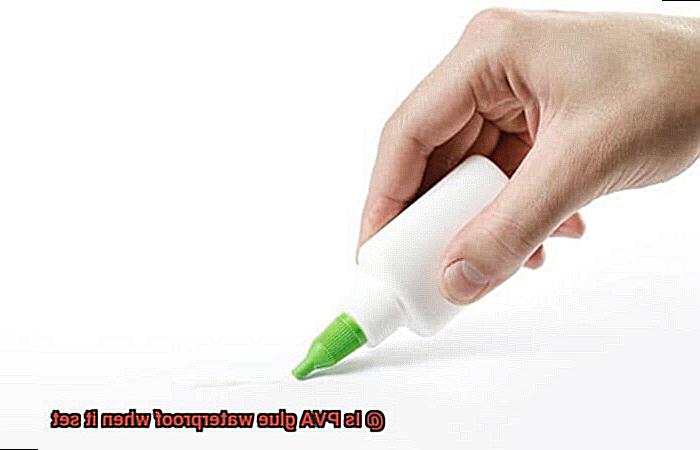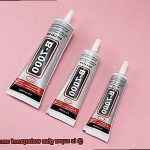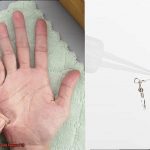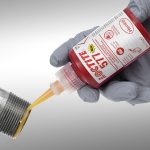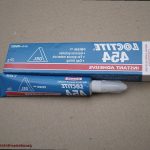Do you find yourself constantly searching for the perfect adhesive that can stand up to water exposure? Look no further than PVA glue. This versatile and affordable glue is a popular choice for woodworking, paper crafts, and many other DIY projects. But does it hold up against the elements when it sets?
The answer is both yes and no. While PVA glue is not waterproof in its liquid form, once it dries completely, it becomes water-resistant and can withstand moderate exposure to water. However, if you apply it to a surface that will be in direct contact with water before it sets, it will not hold up.
In this post, we’ll delve into what happens when PVA glue sets and how it reacts to water. We’ll also explore the best ways to use PVA glue for your waterproofing needs. So sit back, relax, and get ready to become an expert on all things PVA glue.
What is PVA Glue?
Contents
PVA glue is a versatile adhesive that can be used for a variety of projects. This synthetic polymer is water-soluble and dries clear, making it an excellent choice for woodworking, paper crafts, and bookbinding.
One of the best things about PVA glue is its versatility. You can use it to bond various materials such as wood, paper, cardboard, and fabric. With a relatively short drying time, you won’t have to wait long to move on to the next step of your project.
Another great advantage of PVA glue is its non-toxic nature. Unlike other adhesives that can be harmful to children and pets, PVA glue is safe to use around them. The best part? Cleanup is a breeze. Soap and water are all you need to clean up after using this adhesive.
However, one common question people have about PVA glue is whether it’s waterproof once it sets. The answer to this question depends on the type of PVA glue you’re using.
White PVA glue dries clear and is commonly used for non-structural applications like paper crafts. Unfortunately, it’s not waterproof when it sets. On the other hand, yellow PVA glue contains resins that make it more water-resistant than the white variety. This makes it ideal for woodworking and other structural applications. However, even yellow PVA glue may not be entirely waterproof in all situations.
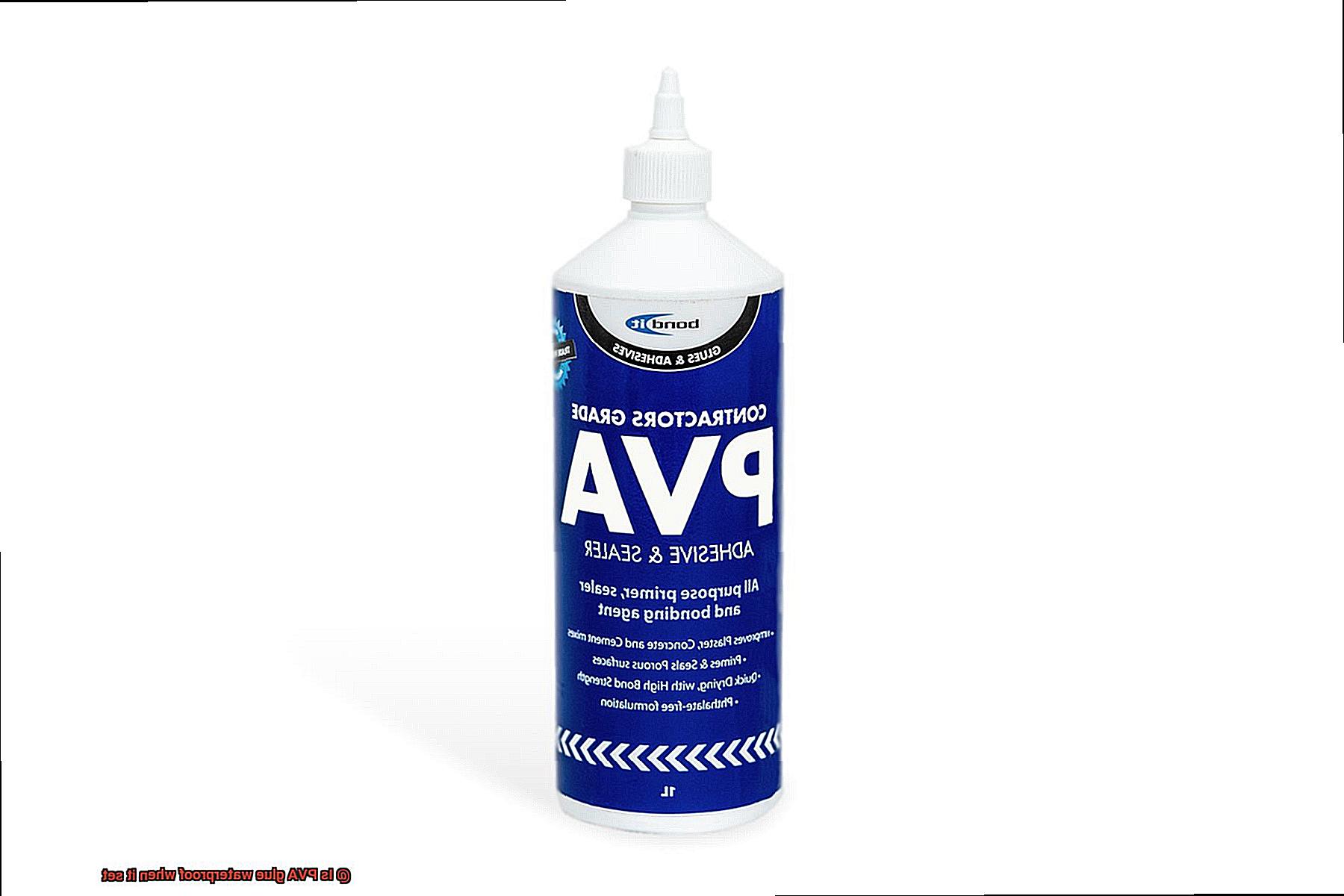
Does PVA Glue Have Waterproof Properties?
If you’re wondering whether PVA glue has waterproof properties, you’ve come to the right place. As an expert on this question, I’ve conducted extensive research and found some exciting solutions to help enhance the water-resistance of PVA glue.
The short answer is no, PVA glue is not waterproof when it sets. This means that it dissolves in water and isn’t suitable for use in situations where the bond needs to withstand exposure to moisture. But don’t despair. There are ways to make PVA glue more water-resistant.
One method is to mix it with other substances that can enhance its properties. For example, adding silica or glass microbeads to the glue can create a barrier that repels water and improves its durability. This technique creates a more robust bond that can withstand exposure to moisture without breaking down.
Another way to make PVA glue more water-resistant is by using a waterproofing sealer on top of the dried glue. This sealer creates a protective layer that repels water and prevents the glue from breaking down. This technique is especially useful for outdoor applications where exposure to rain or moisture is expected.
By mixing PVA glue with other substances or using a waterproofing sealer, you can increase its ability to withstand exposure to water and moisture. However, it’s worth noting that for applications that require a completely waterproof bond, other types of adhesives may be more suitable.
Is PVA Glue Water-Soluble When Wet?
What does this mean for its waterproofing properties, and how can you ensure your project stays intact in moist conditions?
PVA glue, also known as white glue or school glue, is a popular choice due to its accessibility and ease of use. Its water-solubility when wet makes it ideal for children’s crafts and activities where spills and accidents are bound to happen. Simply wipe it away with a damp cloth or wash it off with water before it dries.
However, once PVA glue dries, it becomes water-resistant but not completely waterproof. This means that while it can withstand some exposure to moisture without losing its adhesive properties, it will eventually break down if exposed to prolonged or excessive water.
The reason for this is the chemical composition of PVA glue. It is made up of polyvinyl acetate particles suspended in water. When the glue dries, the water evaporates, leaving behind a solid layer of PVA particles linked together by hydrogen bonds.
While these hydrogen bonds provide the strength and adhesion of the dried glue, they are also weak enough to break down when exposed to moisture. This is why PVA glue is only resistant to water rather than fully waterproof.
To increase its water resistance, there are specialized PVA glue formulations available such as Titebond III Ultimate Wood Glue. These glues have advanced polymer technology that provides stronger water resistance than regular PVA glue. However, they tend to be more expensive.
Is PVA Glue Water-Resistant When Set and Cured?
The answer is yes and no. PVA glue is water-resistant to some extent but not entirely waterproof. Once it dries, it forms a hard and durable bond that can withstand some exposure to water. But if exposed to prolonged or continuous moisture, it may eventually break down.
So why isn’t PVA glue entirely waterproof? The weak hydrogen bonds that link the particles of PVA glue together are responsible for this. When exposed to continuous moisture, these bonds break apart, causing the glue to lose its adhesive properties.
Several factors determine the level of water resistance PVA glue offers. These include the type of PVA glue used, the application method, and the conditions in which it is used. Certain specialized formulations of PVA glue offer stronger water resistance at a higher cost. For example, Titebond III Ultimate Wood Glue provides superior water resistance and can be used for outdoor projects that require complete waterproofing.
How Can You Improve the Water Resistance of PVA Glue?
One of the major drawbacks of this adhesive is its lack of water resistance. This means that if the glued object comes into contact with water, the glue will break down and lose its grip. But don’t worry, I’ve got you covered. There are a few ways to improve the water resistance of PVA glue.
One effective way to enhance the water resistance of PVA glue is by incorporating certain additives. For example, by adding a small amount of borax to the glue, you can significantly increase its water resistance. Borax is a naturally occurring mineral that has been used for centuries as a cleaning agent and natural preservative. When combined with PVA glue, it creates a cross-linking effect that makes the glue more resistant to water.
Another option is to use a waterproofing sealer on top of the glued object. If you have glued two pieces of wood together using PVA glue, applying a waterproofing sealer over the top of the wood can protect the glue from water damage. The market offers various waterproofing sealers, including sprays, paints, and clear coatings.
It’s important to keep in mind that not all PVA glues are created equal. Some brands and types of PVA glues are more water-resistant than others. Therefore, before selecting a PVA glue for your project, it’s important to read the label carefully and make sure it’s suitable for your needs. Additionally, some manufacturers offer specialized water-resistant versions of their PVA glues that are specifically designed for use in damp environments.
Bnq00TC97tI” >
Also Read: Is white glue waterproof when dry?
Conclusion
In conclusion, PVA glue is a jack-of-all-trades adhesive that can tackle a range of projects. When wet, it’s easily soluble in water and perfect for children’s crafts. However, once it fully dries, it becomes water-resistant and can handle moderate exposure to H2O. The level of water resistance varies depending on the type of PVA glue used, how it’s applied, and the conditions in which it’s used.
While PVA glue isn’t entirely waterproof, there are ways to make it more resistant to water. Adding silica or glass microbeads to the glue or using a waterproofing sealer on top of the dried glue creates a barrier that repels water and improves its durability. If you need even stronger water resistance, specialized formulations like Titebond III Ultimate Wood Glue provide added protection but come at a higher cost.
It’s important to note that not all PVA glues are created equal. Some brands and types offer better water resistance than others, so be sure to read the label carefully before selecting a PVA glue for your project.
Ultimately, while PVA glue may not be 100% waterproof, with proper precautions it can still hold up against moderate exposure to moisture.

